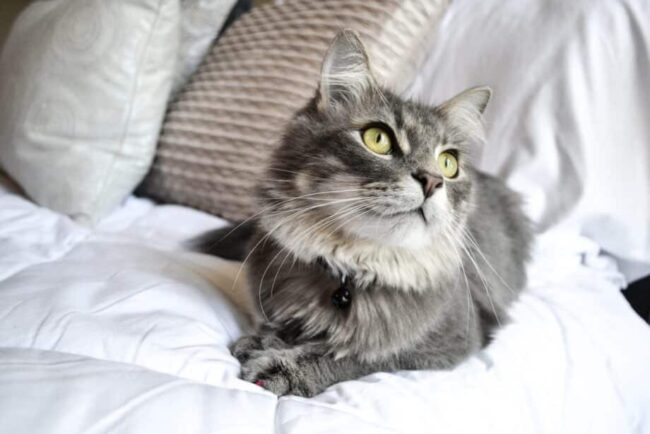If you’re a cat lover, you know the joy these furballs bring into your life. But have you ever paused to consider how long your adorable feline friend will share life with you? Understanding your cat’s lifespan and how to enhance it is not just interesting; it’s crucial. In this comprehensive guide, we’ll explore everything you need to know about how long house cats live and what factors can influence their longevity.
How Long Do House Cats Typically Live?
House cats can live up to 17 years if properly cared for, and sometimes even longer. While genetics play a part, good nutrition, and proper home care are significant contributors to your cat’s lifespan. High-quality food that meets your cat’s nutritional needs can work wonders for its overall health. But remember, proper care goes beyond just feeding; it also includes emotional well-being and safety. Indoor cats generally live longer than outdoor cats, primarily because they’re less exposed to hazards like predators and road accidents.

Understanding the Life Stages of a Cat
Cats experience various phases of life, each with its unique set of needs and challenges. Let’s explore:
- Kitten (0-6 months): At this stage, cats are learning quickly about their environment. They are developing vital skills for survival and play, growing rapidly both physically and cognitively.
- Junior (6 months to 2 years): Cats reach full size and continue to refine their motor skills and social behaviors during this stage.
- Prime (3-6 years): Cats are at their physical peak here, enjoying good health, agility, and an active lifestyle.
- Maturing (7-10 years): You may notice your cat slowing down and gaining some weight as they approach what is often termed as the ‘old age’ phase.
- Senior (11-14 years): Now in their golden years, cats require extra attention to their health. Regular veterinary check-ups are essential.
- Super Senior/Geriatric (15+ years): Cats at this stage often have specific medical needs. Monitoring for signs of illness becomes crucial.
Life Expectancy by Breed
| Cat Breed | Life Expectancy |
| Siamese | Up to 20 years |
| Calico | Up to 15 years |
| Bengal | Up to 16 years |
| Burmese | Up to 18 years |
| Savannah | Up to 20 years |
| Ragdoll | Up to 18 years |
| Russian Blue | Up to 20 years |
| American Shorthair | Up to 20 years |
| Sphynx | Up to 15 years |
| Manx | Up to 14 years |
What Influences a Cat’s Longevity?
Regular Medical Care
Cats are good at hiding their ailments. Regular vet check-ups can help identify any hidden health issues. These could range from dental problems to more severe conditions that are best treated when caught early.
Diet and Nutrition
Your veterinarian can guide you in choosing the right diet that meets your cat’s unique nutritional needs. High-quality, well-balanced food is fundamental for long-term health.
Exercise and Mental Stimulation
Keeping your cat active can contribute to a longer life. Simple activities like playing with toys or chasing laser dots can make a huge difference in your cat’s quality of life.
Emotional Well-being
A happy cat is often a healthy one. Interacting with your cat regularly and providing a stimulating environment can go a long way in enhancing their emotional well-being.
Common Health Concerns in House Cats
It’s vital to be aware of frequent ailments that could affect your cat, such as diabetes, feline lower urinary tract disease, or even fleas and ticks. Regular vet visits can help in early detection and treatment, thus contributing to a longer, healthier life for your cat.
What to Expect as Your Cat Ages
With aging, your cat will face both physical and behavioral changes. They may become less active, face difficulty in digesting food, or even suffer from reduced sensory capabilities. Conditions like arthritis or kidney failure become more common. It’s essential to adapt their care routine as they age to maintain a good quality of life.
How to Extend Your Cat’s Life
You can take several steps to help your cat live a longer, happier life:
- Spaying/Neutering: Reduces the risk of diseases and unwanted pregnancies.
- Regular Vet Visits: For early detection of health issues.
- Vaccinations: Keep your cat immunized against common diseases.
- Daily Exercise: Helps in keeping your cat physically fit.
- Quality Diet: Feeding a well-balanced diet.
- Night-time Safety: Keep your cat indoors during the night to minimize risks.
Conclusion
Caring for your cat is akin to a long-term commitment that’s full of rewards. By providing the right blend of medical care, emotional well-being, and nutritional support, you’re not just lengthening your cat’s lifespan but also enriching the quality of life you share together. In the end, it’s about creating countless joyful moments with your feline friend that make every second worth it.

Editorial Staff
Our writers, editors, content managers, and SEO specialist. We all take part in crafting amazing articles. We spend hours ensuring that each article is based on facts, researched, and thorough. You'll never want to click the back button to look for more answers other than here!
